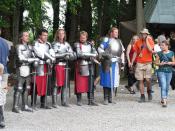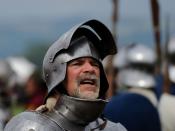Chivalry, the order of knighthood, and especially, the code of knightly behavior,
comes from many origins. In Middle English, the word 'chevalrie' meant 'mounted
horseman'. In Old french, the word 'chevalrie' meant knightliness or 'chevalier'
meaning knight. (Microft, Encarta) Almost all origins of the word meant horseman.
Warfare was not an option in the medieval period and the knight was the most
crutial part. The knight's ability, and the military strength of the lord or king were
nessesary for their survival. A knight was loyal to his king even though he was not always
a member of his personal court. He was also loyal to his lord or landowner. Most of all,
he was loyal to God, as all Christian knights were. A Christian knight had virtues of
fidelity, piety, loyalty and devotion to God. However, some knights did not live this ideal
lifestyle. (Duby)
A young boy in training to be a knight spent the first few years of his life in care
of the women in his family.
At the age of 7 years old, a child of noble birth would be
placed in the castle of a lord or govenor. This is where the training for knighthood
began. As a page, the boy would be tutored in Latin and French, but he devoted most of
his time to physical exersice, and duties. A page was educated in wrestling, tilting with
spears, and military exercises that were done on horseback. He was also taught dancing
and playing of musical instruments in their leisure time. As a page, a boy was taught
how to carve and serve food as a waiter, and other services around the castle. It was his
duty to help the master of the castle in anyway needed. These tasks were not hard labor,
but simply...


